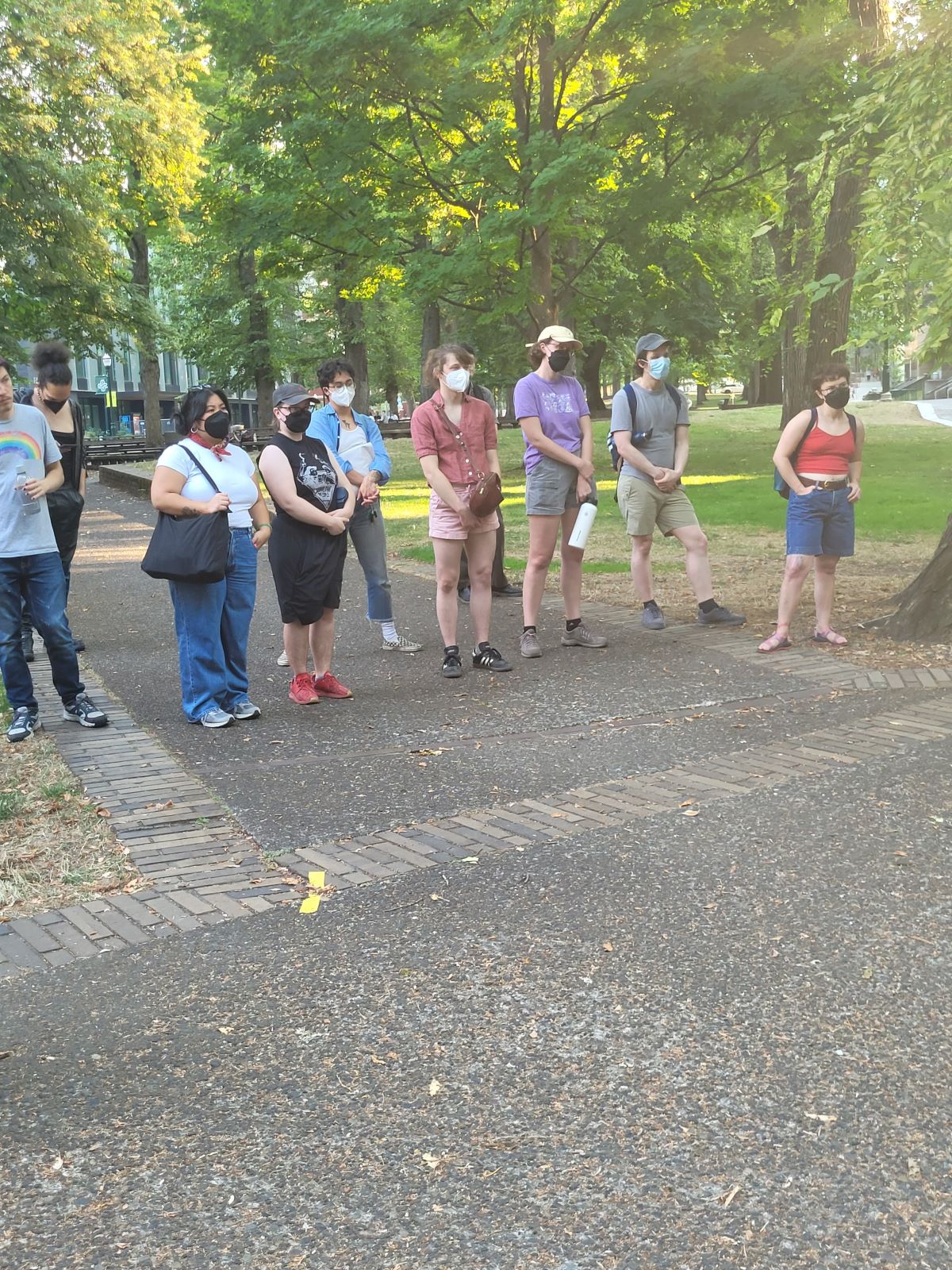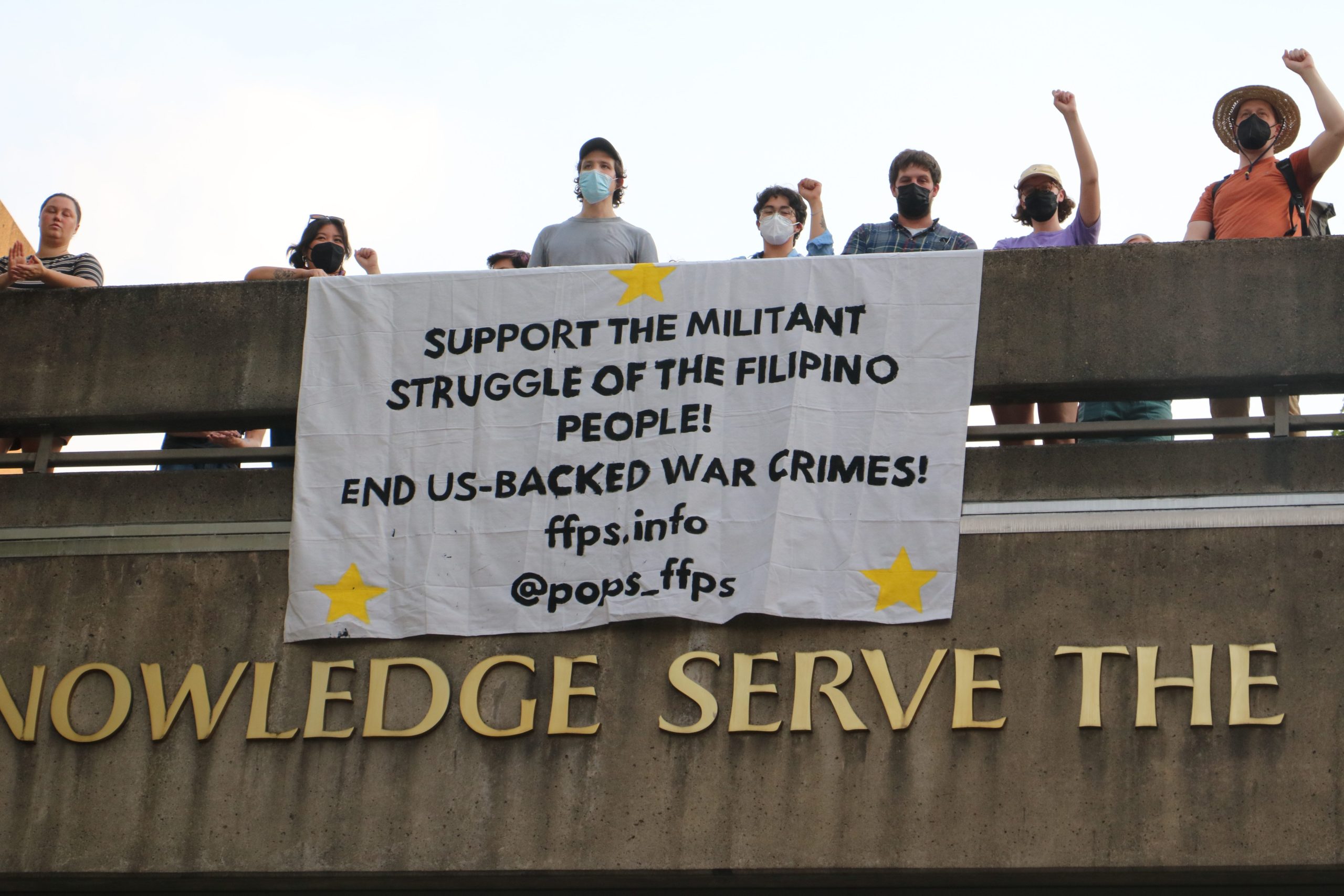Members and supporters of People Organizing for Philippine Solidarity (POPS) and Friends of the Filipino People in Struggle (Friends-FFPS) marched on Aug. 26 from SW Park Ave. and SW Montgomery St. to on SW Broadway and Montgomery. It was in support of the National Democratic Front of the Philippines’ (NDFP) movement. They protested the ongoing United-States-backed war crimes, which were reportedly sanctioned by the fascist Marcos Regime and U.S imperialists, who recently signed a deal to build five nuclear reactors on the Philippine coast.
The march happened on the anniversary of the Pugadlawin—the day in 1896 when Filipinos tore up their community tax certificates to protest the Spanish government’s colonization. The march culminated in dropping a banner over the “Let Knowledge Serve the City” bridge which read, “Support the militant struggle of the Filipino people! End US-backed war crimes!”
“POPS is a member organization of Friends-FFPS, a global alliance of non-Filipinos who are united in the belief that the Filipino people have the right to struggle against oppressive rule by any means necessary,” said Sam Miller, U.S. coordinator for Friends-FFPS and member of POPS.
“Today, we came out as a part of a day of coordinated global action,” Miller said. “We are really trying to raise awareness and bring more people to support the struggle of the Filipino people against oppressive rule, which is primarily dictated by U.S. imperialism. Even though the U.S. granted the Philippines independence, the Filipino people have been under puppet rule of the U.S. since 1945.”
According to the POPS Instagram page, Filipino President Ferdinand Romualdez Marcos Jr. continues to work with the U.S. to sell off the Philippines’ rich resources while further impoverishing the Filipino people. He’s the son of dictator Ferdinand Marcos, who was ousted in 1986 and forced to flee the country.
“In today’s neoliberal era, institutions like the Asia-Pacific Economic Cooperation (APEC) provide Marcos with a venue to privatize, deregulate, and denationalize industry in the Philippines and enact unequal trade agreements, all while he continues to escalate state terrorism and war crimes against the people,” a POPS Instagram post stated.
The post explained how the Marcos’ anti-people policies have attracted foreign corporations like NuScale Power Corporation, which is based in Portland and has recently struck a $7 billion deal to build small modular reactors (SMRs) in the Philippines. Five SMRs will be built along the Philippine coast facing the South China Sea. This will place the Filipino people in a dangerous position amid the U.S.’s escalating inter-imperialist conflict with China and expose them to the risks associated with these SMRs.
In a speech before the march, POPS member Emily Konkel explained how President Marcos has ramped up fascist attacks against the Filipino people.
“In recent years, Marcos has increased collaboration with the U.S. military, has further exacerbated inflation rates, jobs remain scarce and Filipinos are forced to find work overseas,” Konkel said. “There were 104 recorded political killings in the Philippines in the Marcos Jr. regime’s first year alone, and the youngest victim was only 14 years old. All of these atrocities continue as Marcos also focuses on further endangering the Filipino people by allowing corporate schemes, like their alliance with NuScale.”
According to Konkel, one member of NuScale’s board of directors is also a founding member of APEC—a forum where heads of state and corporate leaders gather to “make decisions that have major repercussions on workers all over the world by decreasing environmental and labor regulations, increasing free trade, and purposefully ignoring the voice of the people.” The APEC heads of state will gather this November in San Francisco, and Konkel urged supporters to join them there and confront them.
“We invite you to join us in confronting the enemy, Ferdinand Marcos Jr., a puppet of U.S. imperialism,” Konkel said. “In POPS, we believe that the National Democratic Revolution is the solution to liberate the Filipino people. The National Democratic Front of the Philippines, or NDFP, is fighting for the Filipino masses and this National Democratic Revolution. We support the militant revolutionaries fighting for liberation in the Philippines and recognize their struggle as a just means of obtaining liberation.”

Tiffany Ganir—an academic and career advisor at Portland State and attendee of the march—explained how institutions such as PSU play a role in overseas struggles. “At PSU, the School of Business partners with weapons manufacturers like Boeing,” Ganir said. “Boeing has an internship program that funnels interns into the supply chain management, and interns don’t necessarily know that. I know they’re part of a neoliberal system where they’re helping this company function, but they’re also contributing to… the U.S. war of aggression.”
Ganir said that she expects marches like this one to educate people about the current situation in the Philippines. She believes that only a few individuals are well-informed about the challenges faced by the Filipino people today.
“People don’t know much about what’s happening in the Philippines,” Ganir said. “We see a lot of propaganda that doesn’t tell the full story, but we have people [in the PSU community] that are actively trying to spread awareness. We have partnerships—not just with the Portland community, but also with the PSU community, students, staff and faculty—who are actively supporting our efforts.”
Sam Butler—a PSU student studying urban and public affairs and a member of the Cuba Solidarity Club—said it is important to him to participate in acts of international solidarity like the Aug. 26 march.
“Struggles in the Philippines and other areas relate to struggles we have here in the United States,” Butler explained. “In the Philippines, obviously it’s… more immediately violent and urgent, but it is ultimately similar struggles in some ways. They’re essentially fighting rich people, imperialists, and war machines. Those sort of things that are important to us [in the U.S.] as well. It’s nice to show solidarity with people all over the world.”






